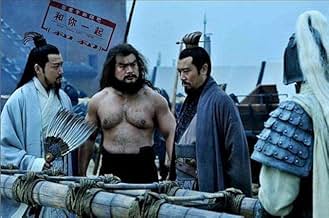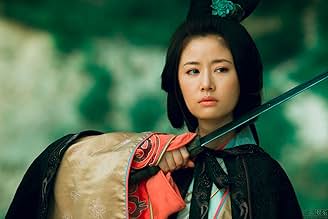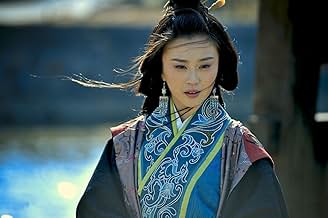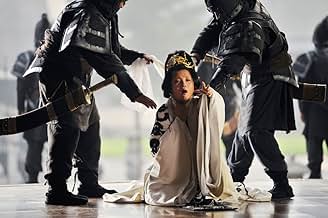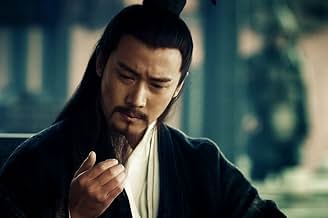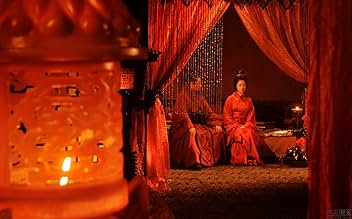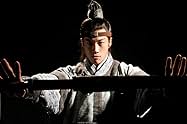San guo
- Série télévisée
- 2010
- 45min
Un fonctionnaire est envoyé pour démanteler une unité de recherche dans le manoir d'un seigneur excentrique. Il rencontre les filles du seigneur, qui le mettent à l'aise, ce qui l'amène à ré... Tout lireUn fonctionnaire est envoyé pour démanteler une unité de recherche dans le manoir d'un seigneur excentrique. Il rencontre les filles du seigneur, qui le mettent à l'aise, ce qui l'amène à réévaluer ses projets d'avenir.Un fonctionnaire est envoyé pour démanteler une unité de recherche dans le manoir d'un seigneur excentrique. Il rencontre les filles du seigneur, qui le mettent à l'aise, ce qui l'amène à réévaluer ses projets d'avenir.
- Récompenses
- 12 victoires et 13 nominations au total
Parcourir les épisodes
Avis à la une
(Don't be fooled by the picture posted above - it is the one for the movie Three Kingdoms that was released recently.)
This series is simply terrific. It was quite an ambitious undertaking, for one. A whopping 95 episodes, fast-paced and intricate in many parts. It largely follows the novel Romance of the Three Kingdoms though it does deviate in some parts. It's been almost 3 decades since the last notable attempt at serializing Romance, and now with plenty of Yuan and manpower to throw around, the deed has been accomplished. First, the scenery is remarkably grand and beautiful (both natural and CG) - from Zhuge Liang's hut in the middle of a forest, to gratuitous (though appreciated) shots of the Yangtze River, to the rather intimidating sights of tens of thousands of little armored men rushing forward.
Second, I appreciated the script. Perhaps it isn't as antiquated as it could have been, but let's be honest. If the producers and scriptwriters conformed to the way scholars of 200 AD spoke, like 8 people would understand. What would be the point? Rather, the writers decided to focus on making the dialogue engaging and meaningful to the target audience. Moreover, it still sounded decently authentic to adequately serve its purpose.
And finally, I enjoyed the acting and character interpretations. Chen caught me off-guard at first with his Cao Cao, but he's seriously grown on me. He has now become the representative Cao Cao in my mind - just devious and cunning enough, but not evil for the sake of being evil as he is sometimes portrayed...though at times of questionable mental stability. Lu Yi's Zhuge Liang is subtle, graceful, and dignified even in distress...not to mention terrific eye-candy... I digress. Zhou Yu's portrayal, though not especially flattering, was conveyed well by Victor Huang, and made me want to give the poor guy a hug (at the risk of disembowelment).
My major complaints would probably include the portrayal of the formidable general Zhang Fei. What are we, five? Did they really need to flatten and degrade a famed general by giving him the intelligence and self-control of a petulant pre-schooler? And Liu Bei's stubborn adherence to his so-called virtue got really old, really fast, though I suspect that had more to do with the man in history/Romance than the series itself.
This series is simply terrific. It was quite an ambitious undertaking, for one. A whopping 95 episodes, fast-paced and intricate in many parts. It largely follows the novel Romance of the Three Kingdoms though it does deviate in some parts. It's been almost 3 decades since the last notable attempt at serializing Romance, and now with plenty of Yuan and manpower to throw around, the deed has been accomplished. First, the scenery is remarkably grand and beautiful (both natural and CG) - from Zhuge Liang's hut in the middle of a forest, to gratuitous (though appreciated) shots of the Yangtze River, to the rather intimidating sights of tens of thousands of little armored men rushing forward.
Second, I appreciated the script. Perhaps it isn't as antiquated as it could have been, but let's be honest. If the producers and scriptwriters conformed to the way scholars of 200 AD spoke, like 8 people would understand. What would be the point? Rather, the writers decided to focus on making the dialogue engaging and meaningful to the target audience. Moreover, it still sounded decently authentic to adequately serve its purpose.
And finally, I enjoyed the acting and character interpretations. Chen caught me off-guard at first with his Cao Cao, but he's seriously grown on me. He has now become the representative Cao Cao in my mind - just devious and cunning enough, but not evil for the sake of being evil as he is sometimes portrayed...though at times of questionable mental stability. Lu Yi's Zhuge Liang is subtle, graceful, and dignified even in distress...not to mention terrific eye-candy... I digress. Zhou Yu's portrayal, though not especially flattering, was conveyed well by Victor Huang, and made me want to give the poor guy a hug (at the risk of disembowelment).
My major complaints would probably include the portrayal of the formidable general Zhang Fei. What are we, five? Did they really need to flatten and degrade a famed general by giving him the intelligence and self-control of a petulant pre-schooler? And Liu Bei's stubborn adherence to his so-called virtue got really old, really fast, though I suspect that had more to do with the man in history/Romance than the series itself.
it is one of my favorite series. sure, as inspired adaptation of a remarkable book. for realism. for the portrait of characters. for the fight scenes and for the poetry of image, for the exploration of the essence of power and its fruits, responsibilities, for the vulnerable victories and for the great cinematography, off course, I am profound subjective about it. but , maybe, one of the reasonable explanations, is the flavor of the stories/fairy stories from my youth, discovered in this impressive series. because it is not an answer to Hollywood blockbusters or to historical European series. it is not one of too touching and small Larousse like the South Korean series or demonstration of the seductive honey of the Ottoman past like the Turkish historical series. it is...Chinese. in each scene, detail, dialogue, refreshing air of a classic story in the right manner presented.
I've never read Romance of the Three Kingdoms, so I had no preconceptions when watching this series. I found the casting and the acting to be extremely well done, with every character believable and relatable. The story was complex and engaging, and the characters and their noble aspirations, heroism, courage, loyalty, compassion and more were simply inspirational. I found myself in tears often, deeply touched by someone's kindness, or humility, particularly Liu Bei, and I was even inspired to be a better person in my own life after witnessing such profound values. I have watched the entire series twice and am now re-watching again as it is helping me to learn Chinese. It makes me feel so deeply connected with ancient China and fills me with profound respect. If only we could see more of this side of China.
Depicts the constant tension between personal ethics and statecraft, ambition and moral considerations. Fascinating series. Greek myths will seem psychologically simplistic after this. Only negatives are the simpering females - did they really all simper like that? - and bad subtitling. The English subtitling does no justice to the nuances in the Chinese original. Characters sometimes express themselves in very poetic terms, and this is not at all properly translated. Similarly, words ('gonna', 'wanna')more appropriate to cowboys are used to translate courtly language. The series is a selection of major actions in the very long novel of the Romance of the Three Kingdoms and the selections differ somewhat from the 1995 CCTV version. However, I much prefer the acting in this one, which is less stylized and more natural.
They say that this show lacks authenticity.
They say that it should not really have women actors, because the source material has very few women. They say that the 1995 version is better. They are wrong and misguided. This period in Chinese history (220–280 AD) is rich in material, and the series is based on Luo Guanzhong's 'Romance of the Three Kingdoms'. It's NOT the authoritative historical record. That is Chen Shou's 'Records of the Three Kingdoms'. So we're not dealing with history, really. We're dealing with a very popular account of that time. The complainers are just married to the first version they saw. Not to actual history.
What is so interesting about this is that it's about military and political strategy. The Han dynasty had a crisis in leadership and the warring factions do battle. The clever ones survive. Everyone uses some form of strategy to get what they want. It's very much 'The Art of War' by Sun Tzu and 'The Prince' by Machiavelli.
They say that it should not really have women actors, because the source material has very few women. They say that the 1995 version is better. They are wrong and misguided. This period in Chinese history (220–280 AD) is rich in material, and the series is based on Luo Guanzhong's 'Romance of the Three Kingdoms'. It's NOT the authoritative historical record. That is Chen Shou's 'Records of the Three Kingdoms'. So we're not dealing with history, really. We're dealing with a very popular account of that time. The complainers are just married to the first version they saw. Not to actual history.
What is so interesting about this is that it's about military and political strategy. The Han dynasty had a crisis in leadership and the warring factions do battle. The clever ones survive. Everyone uses some form of strategy to get what they want. It's very much 'The Art of War' by Sun Tzu and 'The Prince' by Machiavelli.
Le saviez-vous
- ConnexionsRemake of San guo yan yi (1995)
Meilleurs choix
Connectez-vous pour évaluer et suivre la liste de favoris afin de recevoir des recommandations personnalisées
- How many seasons does Three Kingdoms have?Alimenté par Alexa
Détails
- Durée45 minutes
- Couleur
Contribuer à cette page
Suggérer une modification ou ajouter du contenu manquant


